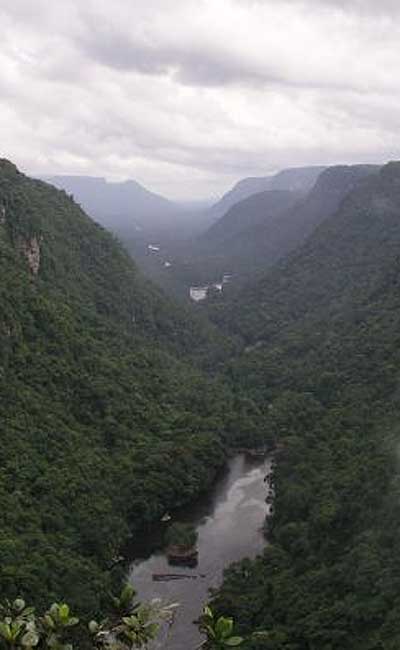Britain backs Guyana's rainforest plan

Your support helps us to tell the story
From reproductive rights to climate change to Big Tech, The Independent is on the ground when the story is developing. Whether it's investigating the financials of Elon Musk's pro-Trump PAC or producing our latest documentary, 'The A Word', which shines a light on the American women fighting for reproductive rights, we know how important it is to parse out the facts from the messaging.
At such a critical moment in US history, we need reporters on the ground. Your donation allows us to keep sending journalists to speak to both sides of the story.
The Independent is trusted by Americans across the entire political spectrum. And unlike many other quality news outlets, we choose not to lock Americans out of our reporting and analysis with paywalls. We believe quality journalism should be available to everyone, paid for by those who can afford it.
Your support makes all the difference.Britain is backing an offer by the President of Guyana to preserve the country's entire 50 million acres of rainforest in return for sustainable development funds.
Phil Woolas, the Environment minister, will support the offer by President Bharrat Jagdeo revealed in The Independent last month at the Bali summit on climate change this week. It follows a preparatory conference where China, the US and other major economies, agreed to put protection of the world's forests on the climate change road map that Bali is supposed to produce this week.
"The UK Government sees this as a significant and welcome step. While we respect countries' sovereignty, the offer from President Jagdeo is a groundbreaker and we will be looking at it at official level to see what part Britain can play," Mr Woolas said.
Tropical deforestation accounts for one-fifth of all carbon emissions more than any other sector except energy but has received little attention in comparison with aviation.
The government of Guyana has said it is willing to place its entire standing forest under the control of a British-led, international body in return for a bilateral deal with the UK that would secure development aid and the technical assistance needed to make the change to a green economy. There is no question of challenging Guyana's sovereignty over its forest.
Britain already has an agreement for forest protection with the countries of the Congo basin and is involved in sustainable development pilot projects in Brazil and Indonesia. The 50m spent in Congo comes from a Department for International Development fund that still has money to allocate.
Mr Woolas said President Jagdeo had impressed him during a Commonwealth meeting in London last month. And the minister is optimistic that the offer will be taken up. A senior spokesman for President Jagdeo welcomed the support, saying: "We now need to start working together to harness the resources and innovation of global capital markets, who will provide the long-term answer to avoiding deforestation. We can present the world with a model for addressing the root causes of deforestation."
The Guyanese proposal was raised at the preparatory conference in Indonesia a month ago when 27 countries including the US and China agreed that deforestation should be included in the Bali final communiqu. Forests were left out of the Kyoto protocol the world's only attempt to date to limit harmful emissions of heat-trapping gases.
Roughly the size of the UK, Guyana is sandwiched between Brazil and Venezuela. It is the only English-speaking country in South America and with its history in the sugar trade and Caribbean links, is primarily a coastal culture. With a population of only 750,000 it combines dense, species-rich forests with low population pressure.
Frank Field, a former Labour minister, has joined the growing calls for Gordon Brown to back the President of Guyana's proposal. Mr Field, the co-founder of the Cool Earth pressure group with the businessman Johan Eliasch, has written to the Prime Minister suggesting that he acts to give UK taxpayers a Christmas present in the form of safeguarding these huge tracts of rain forest.
The letter also suggests that such action would challenge Western countries to begin immediately compensating rainforest nations for the environmental services those forests provide for the whole world.
Matthew Owen, Cool Earth's director, pointed to the 800m Environmental Transformation Fund the Government has recently created and suggests that cash from the fund should be released immediately as the first of annual payments to Guyana to protect the integrity of its rainforest.
Sir Nicholas Stern, whose review last year shifted attitudes to climate change, has again emphasised that tackling the destruction of forests is one of the cheapest and most effective ways of reducing global CO2 emissions.
Mr Field is urging Mr Brown to broker a co-ordinated response from Western nations which will begin by securing Guyana's rainforest. This strategy could then be rolled out to cover other rainforest nations which are anxious to be compensated for the role rainforests perform in mediating the world's weather as well as CO2 emissions.
Join our commenting forum
Join thought-provoking conversations, follow other Independent readers and see their replies
Comments